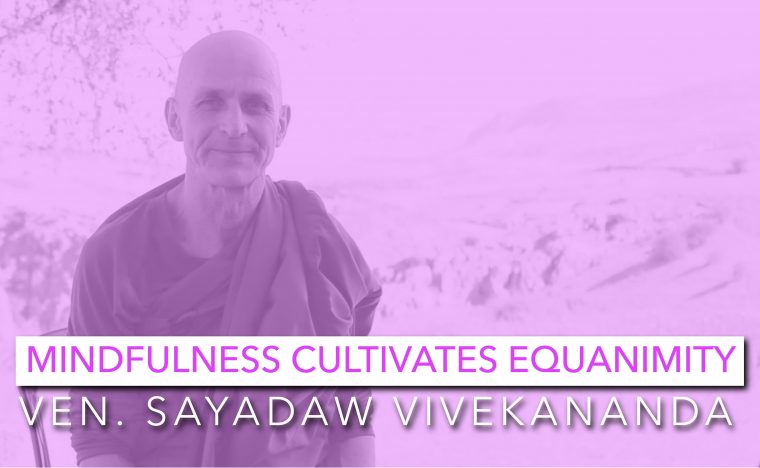What does it mean to have a “balanced mind”, and how can mindfulness meditation help to cultivate it? Mindfulness-based meditation practice has very positive effects on the mind that are experienced as temporary states. A long term committed practice will transform these temporary, positive states into permanent traits… into new a way of being. Buddhism lists these beneficial qualities as “The 7 Factors Of Awakening”, with the culmination in that list of “equanimity”, an exquisitely balanced mind. In the below interview excerpt Vipassana meditation teacher Sayadaw Vivekananda speaks about how “mindfulness cultivates equanimity”.

In the text and video below the Ven. Sayadaw Vivekananda will share with you how Mindfulness Cultivates Equanimity.
Mindfulness Cultivates Equanimity
“Besides the classic seven benefits attributed to the mindfulness meditation as outlined by the Buddha, we have other very practical benefits such as the arising and development of equanimity, also referred to as equipoise, equilibrium, the balance of mind or neutrality of the mind. Now, to have or not to have this particular mental quality will make a big difference. Those who lack equanimity experience a great deal of reactivity. Reactivity is in the sense of liking desirable objects, holding on to desirable objects and rejecting undesirable objects.
The arising of equanimity
In the course of one single day the mind can go from one extreme to the other; from liking to disliking back to liking, and suddenly, once again to disliking. If it happens time and again and one can’t liberate oneself from this reactivity of the mind, that tends to be rather tiring, exhausting. Now, for a person who engages in mindfulness meditation, sooner or later, equanimity as a mental factor comes up. With this, you will then get a sense of it, a taste of what this equanimity is all about, and gradually come to appreciate equanimity.
A balanced state of mind
Once some appreciation is there, you move further into equanimity and strengthen it. When equanimity is quite well established in the mind, then it is as if the mind is not touched by anything anymore, it’s not shaken or perturbed by anything anymore. You can go through life in a very smooth way without the mind continuously going from one extreme to the other. And that then means quite a different quality of life. Those who’ve experienced a fair amount of equanimity usually do very much praise this mental quality.”
Vivekananda, Israel Retreat – 2014
Question: How do you cultivate equanimity in your practice and your life? Leave your comments below!
Ven. Vivekananda Bio
Ven. Vivekananda is the abbot of Panditarama Int. Meditation Center” in Lumbini, Nepal. He is a direct student of the late Ven. Sayadaw U Pandita who placed him as the guiding teacher of Panditarama, Lumbini. Sayadaw Vivekananda has been teaching Vipassana and Loving-kindness (Metta) meditation since 1998, both at his center in Lumbini and internationally. For more info please go to “Panditarama Lumbini.”






Please note: I reserve the right to delete comments that are offensive or off-topic.